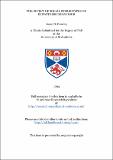The effect of social stereotypes on eyewitness behaviour
Abstract
Eyewitness behaviour is a very important issue in social psychology. Recent years have seen a boom in research in this area; however, very little of this research has addressed the important and fundamental issues raised by the social factors that are involved when eyewitnessing takes place. The present thesis reports research which addresses the effect of social- stereotypic information upon a number of aspects of the eyewitness situation. Of particular interest is the effect of stereotypic information upon the judgment of aggressive and violent actions, and face and body stimuli; on memory for information associated with a dramatic staged incident, when presented either before or after target material; and its impact in an eyewitness interview situation. Finally, an interview technique is designed and tested which aims to reduce the negative impact of stereotypic information on eyewitness memory. Throughout, the impact of stereotypic information presented at encoding and at retrieval is contrasted and compared. The effect of delay between encoding and retrieval is also considered. It is concluded that stereotypic information may affect judgments of information relevant to the eyewitnessing situation whether presented before or after target material. Similarly, stereotypic information may affect memory when it is presented before target material. Little effect is however to be expected on memory when stereotypic information is presented at retrieval, although the exact effects may be found to vary with the nature of the target stimuli used. The source-monitoring interview, based on research by Marcia Johnson and her colleagues, appears a promising means of reducing the distorting effect of stereotypes on memory; particularly when a delay occurs between the encoding and retrieval of target material.
Type
Thesis, PhD Doctor of Philosophy
Collections
Items in the St Andrews Research Repository are protected by copyright, with all rights reserved, unless otherwise indicated.

